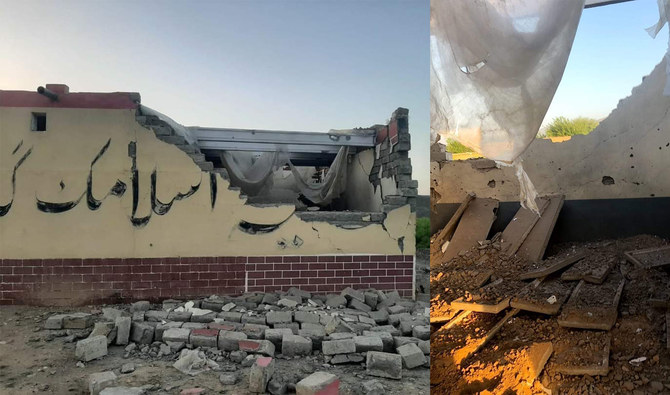KARACHI: A heat wave is expected to hit parts of Pakistan starting today, Monday, Pakistan’s chief meteorologist said, warning that it will “intensify” from May 23 onwards in the South Asian nation at the searing edge of climate change.
Pakistan’s disaster management authority warned last Thursday temperatures in certain areas of Pakistan’s southern Sindh and eastern Punjab provinces could surge to 40 degrees Celsius between May 15-30. On Sunday, the Provincial Disaster Management Authority (PDMA) warned of an “intense” heat wave in the southern districts of Punjab, with severe risk identified in Bahawalpur, Rahim Yar Khan, Dera Ghazi Khan and Multan districts from May 21 to May 27.
Heatwaves, which occur in summer, are caused by slow-moving high-pressure systems leading to prolonged high temperatures. The World Meteorological Organization defines a heat wave as five or more consecutive days during which the daily maximum temperature surpasses the average maximum temperature by 5 °C (9 °F) or more.
“Heatwave conditions are expected from today over Sindh, except Karachi, and the plain areas of Punjab and Khyber Pakhtunkhwa provinces,” Dr. Sardar Sarfaraz, the chief meteorologist at the Met Department, told Arab News.
“Maximum temperatures are expected to remain 4-6 degrees Celsius above average until May 22 and then intensify from May 23rd with temperatures 6-8 degrees above average,” he said, urging citizens to exercise caution.
Pakistan experienced its first severe heat wave in June 2015 when temperatures as high as 49 degrees Celsius struck the country’s south, causing the deaths of about 2,000 people from dehydration and heatstroke. A heat wave in Sindh’s provincial capital of Karachi that year alone claimed 120 lives.
Increased exposure to heat, and more heat waves, have been identified as one of the key impacts of climate change in Pakistan, with people experiencing extreme heat and seeing some of the highest temperatures in the world in recent years. The South Asian country of more than 241 million, one of the ten most vulnerable nations to climate change impacts, has also recently witnessed untimely downpours, flash floods and droughts.
Climate change-induced extreme heat can cause illnesses such as heat cramps, heat exhaustion, heatstroke, and hyperthermia. It can make certain chronic conditions worse, including cardiovascular, respiratory, and cerebrovascular disease and diabetes-related conditions, and can also result in acute incidents, such as hospitalizations due to strokes or renal disease.
Dr. Sarfaraz said other than Karachi, the rest of Sindh province would remain in the grips of scorching heat this month.
“While Karachi will not face a heat wave, the rest of the province and the plain areas of Punjab and Khyber Pakhtunkhwa will be in the grip of the heatwave from today,” he said.
“In Jacobabad, the hottest city of the [Sindh] province, the temperature is expected to reach 50 degrees Celsius during this wave.”
Jacobabad is considered one of the hottest places in the world, with temperatures rising to 50 degrees Celsius between May and August, forcing nearly half the city’s 200,000 people to leave for cooler cities and towns, officials say.
The federal capital of Islamabad, the Khyber Pakhtunkhwa and Balochistan provinces and the Kashmir and Gilgit-Baltistan regions would also see temperatures 4 to 6 degrees Celsius above average from May 21-27, Dr. Sarfaraz said.
SCHOOLS CLOSURES
Separately, the Punjab government announced on Monday it would close public and private schools from May 25-31.
“In view of the surge in temperature and heat wave in the province, all public and private schools shall remain closed for seven days with effect from 25th May 2024 to 31st May 2024,” a notification from the provincial education department on Monday read, adding that exams could be conducted during these days with necessary precautions in place.
Punjab Education Minister Rana Sikander Hayat shared the notification on social media platform X, saying the safety of children would always remain the government’s “priority.”
According to the Global Climate Risk Index, nearly 10,000 Pakistanis have died while the country has suffered economic losses worth $3.8 billion due to climate change impacts between 1999 and 2018.
In 2022, torrential monsoon rains triggered the most devastating floods in Pakistan’s history, killing around 1,700 people and affecting over 33 million, a staggering number close to the population of Canada. Millions of homes, tens of thousands of schools and thousands of kilometers of roads and railways are yet to be rebuilt.
















